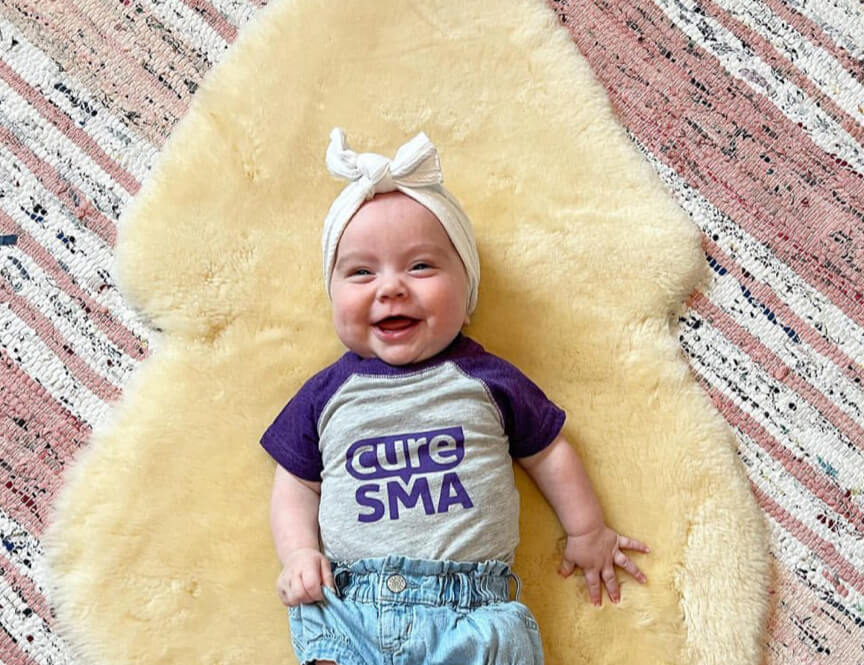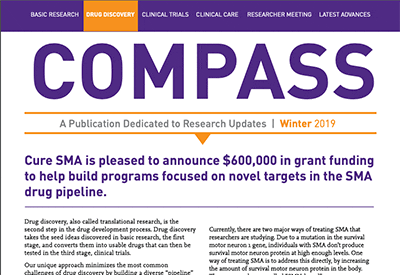Today, Cytokinetics announced data from the Phase 2 clinical study of reldesemtiv in patients with SMA, presented in an oral presentation by John W. Day, M.D., Ph.D., Professor of Neurology and Pediatrics (Genetics), Stanford University, at the 2018 Annual Cure SMA Conference in Dallas. This hypothesis-generating study met its primary objective to determine potential pharmacodynamic effects of reldesemtiv after multiple oral doses in patients with SMA, and secondary objectives to evaluate the safety, tolerability and pharmacokinetics of reldesemtiv. In collaboration with Astellas, Cytokinetics is developing reldesemtiv as a potential treatment for people with SMA and certain other debilitating diseases and conditions associated with skeletal muscle weakness and/or fatigue.
The study showed dose- and concentration-dependent increases in time to muscle fatigue as measured by changes from baseline in Six Minute Walk Distance (6MWD), a sub-maximal exercise test of aerobic capacity and endurance, and Maximal Expiratory Pressure (MEP), a measure of strength of respiratory muscles, after eight weeks of treatment with reldesemtiv. The study, which examined two dose levels of reldesemtiv, 150 mg or 450 mg twice daily, demonstrated dose-dependent increases in 6MWD in ambulatory patients as measured at both post-baseline time points, week four and week eight. In the 150 mg twice daily group, the increase vs. placebo was 10.86 meters (p=0.2531) after four weeks of treatment with reldesemtiv and 7.72 meters (p=0.4684) after eight weeks of treatment. In the 450 mg twice daily group, the increase vs. placebo was 35.63 meters (p= 0.0037) at week four and 24.89 meters (p= 0.0584) at week eight. There was also a statistically significant correlation between Cmax, or peak concentration of reldesemtiv, and change from baseline in 6MWD, with a slope estimate of 9.53 meters/(µg/mL). (p=0.0086).
The study also showed increases vs. placebo in MEP. In the 150 mg twice daily group, the increase in MEP was 5.95 cm H2O (p=0.2276) after four weeks of treatment with reldesemtiv and 11.69 cm H2O (p=0.0378) after eight weeks of treatment. In the 450 mg twice daily group, the increase in MEP compared to placebo was 9.17 cm H2O (p=0.0855) after four weeks of treatment with reldesemtivand 13.15 cm H2O (p=0.0298) after eight weeks of treatment. Other assessments in the study, including the Hammersmith Functional Motor Score – Extended, Revised Upper Limb
Module, Timed Up-and-Go and Forced Vital Capacity did not demonstrate meaningful differences between reldesemtiv versus placebo.
Adverse events were similar between groups receiving reldesemtiv and placebo. The most commonly observed adverse effects were headache, constipation and nausea. Four patients had serious adverse events reported that resulted in early termination of study drug treatment, all considered to be unrelated to reldesemtiv.
“This hypothesis-generating study provides the first data indicating that a muscle-directed therapy, namely a fast skeletal muscle troponin activator, may be clinically beneficial in patients with SMA,” said Dr. Day. “This data is especially encouraging given the unmet need among those adolescent and adult individuals with SMA who have persistent muscle weakness, fatigue and functional impairment.”
“We are pleased that treatment with reldesemtiv showed potentially clinically beneficial effects in adolescent and adult patients with SMA as evidenced by dose-dependent increases vs. placebo in Six Minute Walk and Maximal Expiratory Pressure,” said Fady I. Malik, M.D., Ph.D., Cytokinetics’ Executive Vice President of Research and Development. “We believe that these data support the evaluation of higher doses of reldesemtiv in future clinical trials in SMA given the absence of an efficacy plateau and no dose-limiting safety or tolerability issues. We look forward to working with Astellas, investigators and regulatory authorities to further review the data and consider a potential path forward.”
Clinical Study Design
The primary objective of this Phase 2, double-blind, randomized, placebo-controlled clinical study was to determine the potential pharmacodynamic effects of a suspension formulation of reldesemtiv following multiple oral doses in patients with Type II, Type III, or Type IV SMA. Secondary objectives were to evaluate the safety, tolerability and pharmacokinetics of reldesemtiv. There was no single primary endpoint in this early, Phase 2, hypothesis-generating study.
The study enrolled 70 patients, 39 in Cohort 1 and 31 in Cohort 2. Ambulatory and non-ambulatory (Type II or Type III) patients 12 years of age and older were randomized 2:1, stratified by ambulatory ability, to receive reldesemtiv or placebo dosed twice daily for eight weeks. The first cohort of patients received 150 mg of reldesemtiv or placebo and the second cohort received 450 mg of reldesemtiv or placebo twice daily. Enrollment in this study was stopped short of the targeted 72 patients after blinded analyses of the variability around the changes from baseline of several efficacy measures demonstrated that the study had sufficient statistical power to detect clinically relevant differences versus placebo in efficacy endpoints with the 70 patients already enrolled.
Multiple assessments of skeletal muscle function and fatigability were performed in the study, including respiratory assessments, upper limb strength and functionality for non-ambulatory patients, as well as Six Minute Walk Distance and Timed Up-and-Go for ambulatory patients. In this hypothesis-generating study, all endpoints were evaluated using nominal p-values without adjusting for multiple comparisons. Patients enrolled in the second cohort were also assessed with the SMA Health Index, a patient reported outcome measure. Additional information regarding the study can be found at www.clinicaltrials.gov.
Cure SMA Funding for Combination Therapies
The clinical trials for CK-2127107 materialized because of early seed funding from Cure SMA supporting research focused on the potential application of these specific skeletal muscle activators. In 2014, Cytokinetics released encouraging data from preclinical studies conducted with our funding. The data showed this approach had positive effects in preserving muscle strength and reducing muscle fatigue, setting the groundwork for the ongoing clinical trials.
The progress of this program also highlights the importance of developing combination therapies to treat SMA. The goal is that CK-2127107 will show positive results in preserving muscle strength in human clinical trials, and may lend itself to combination with other SMA therapies, particularly those that address the SMN protein deficiency caused by the SMN1 mutation. The development of combination therapies is particularly important as we seek to treat all types, ages and stages of SMA.
For More Information
Cytokinetics Publishes Clinical Trial Data for CK-2127107
Cytokinetics Receives FDA Orphan Drug Designation for CK-2127107 for SMA



